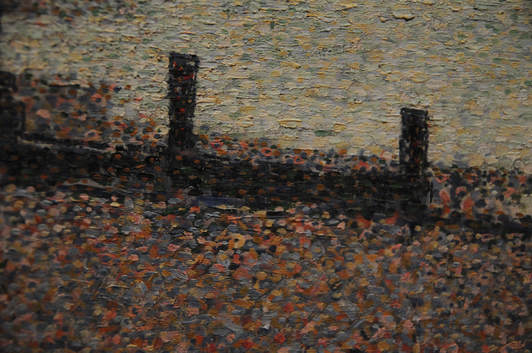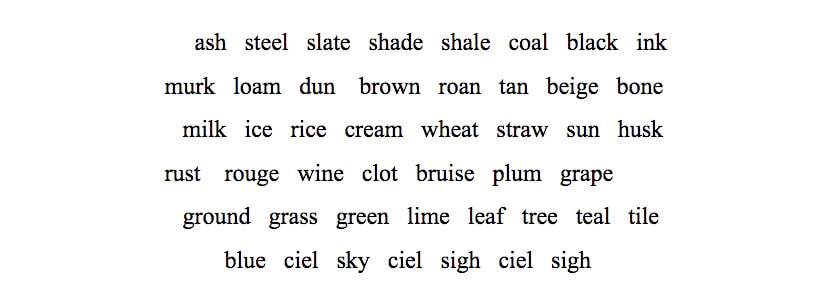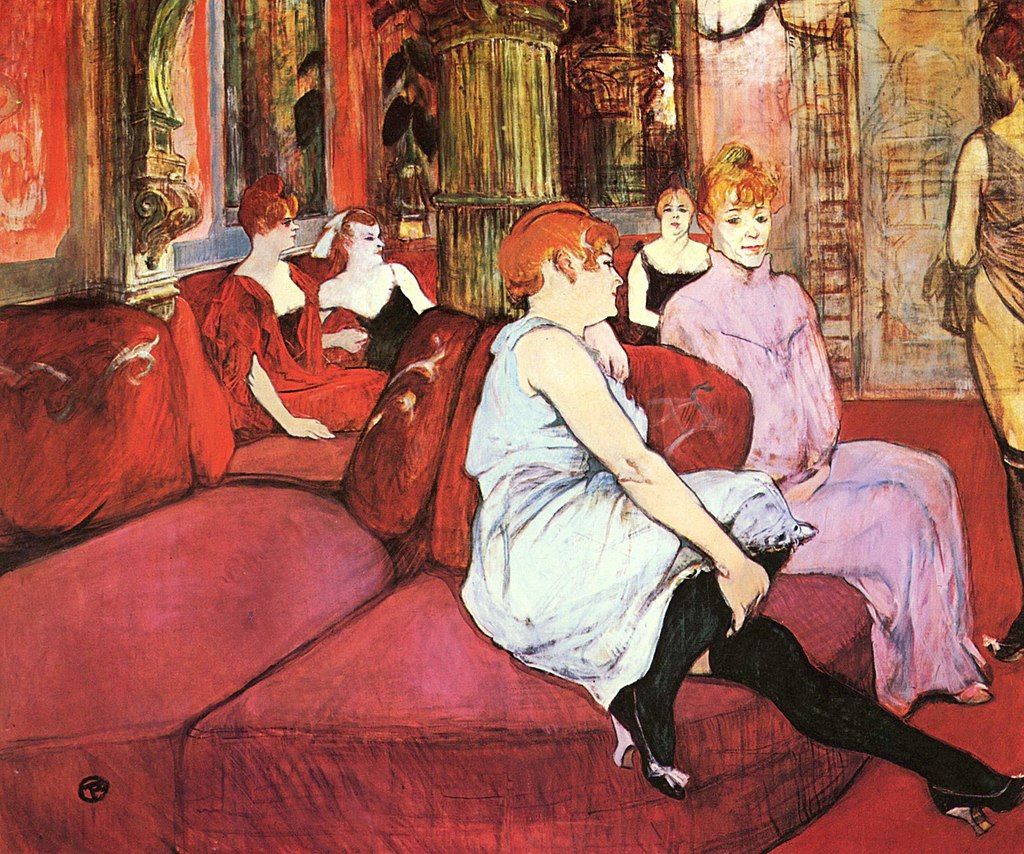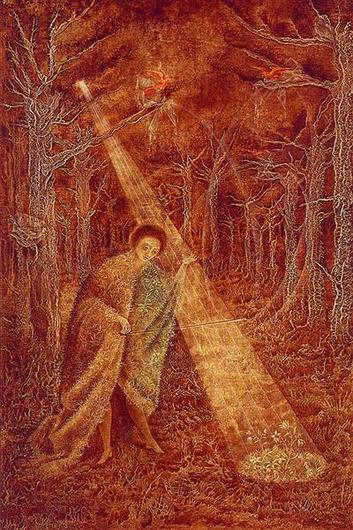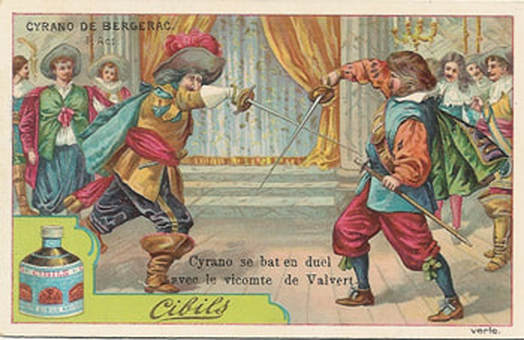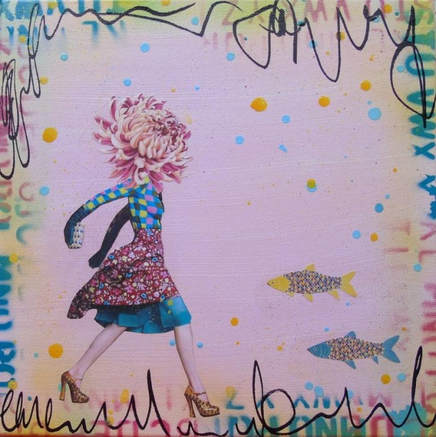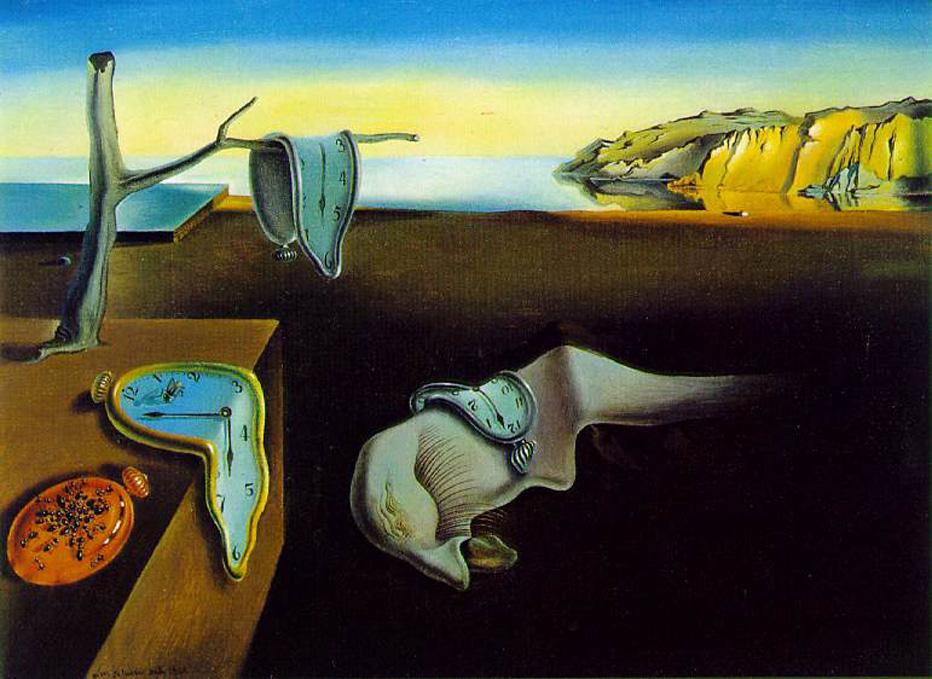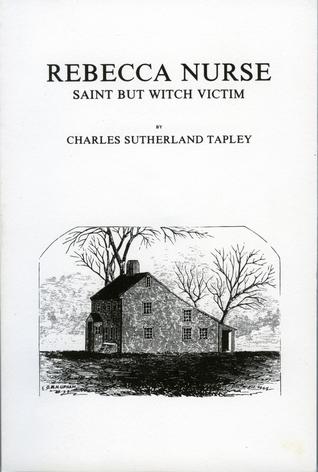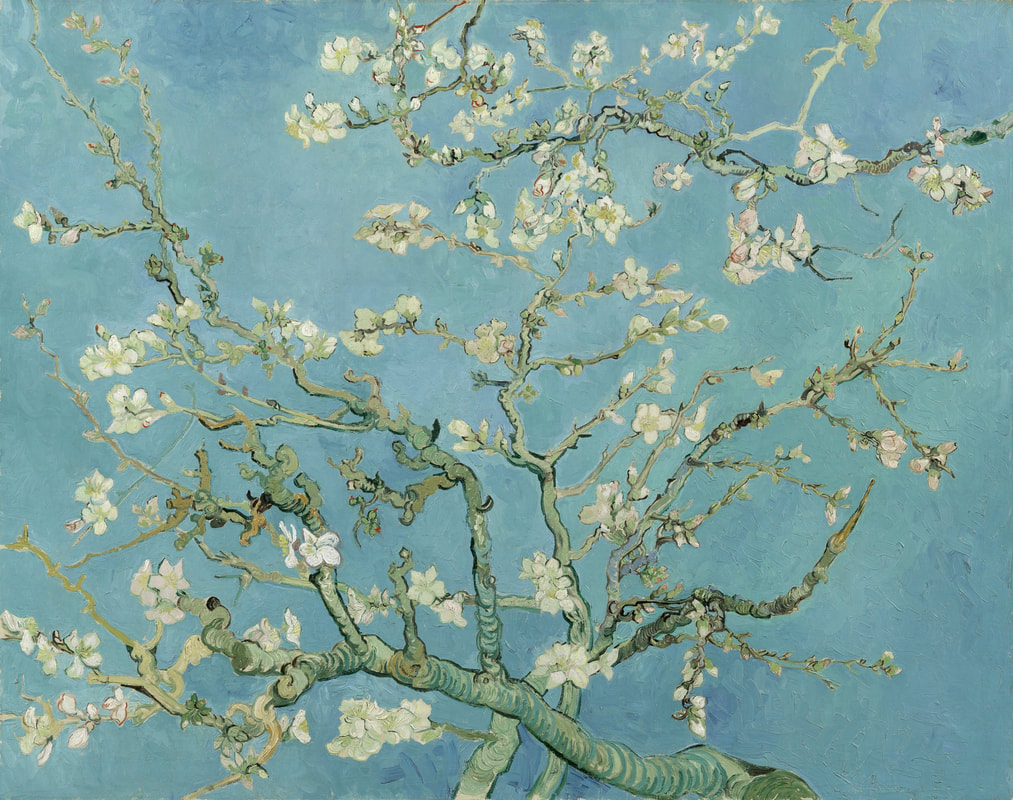|
Hey Georges Seurat Robbie Gamble
Author's Note: "I wasn’t really considering a particular work of art when I wrote this, rather I was thinking about what would it be like to use Seurat’s technique of creating a visual scene using monochromatic dots of coloured paint, but instead using monosyllabic words to create a poetic scene, or soundscape, that evoked colour. I wanted to fool around with words as paint. The work shown echoes what I was striving for in the poem, more or less." Robbie Gamble’s poems have appeared or are forthcoming in Scoundrel Time, Solstice, Slipstream, RHINO and Poet Lore. He was the winner of the 2017 Carve Poetry prize. He works as a nurse practitioner caring for homeless people in Boston, Massachusetts.
0 Comments
Letter from Marielle
(woman in forefront of Lautrec’s Salon de la Rue des Moulins) My dear Henri, I am back at home now-- my hair grown out black again, Spanish falling from my lips, rat-a-tat and crisp, no more the slurry honey of French. How well I remember Madame as she sat in her violet frock, her neck covered primly, thinking of francs and sous. And we girls, draped across lounges, waiting silver-fleshed, our shoulders hinting, waiting to be bought, to slowly pull down those black stockings, to spread our legs, smiling, cooing, crying out oui, ah dieu, oui while all the time we went to some other place-- for me, the golden fields of pampas. But you too moved through the streets pretending-- pretending you were not stunted, pretending you were striding across the cobblestones. That is why you loved my silky arms, murmured to them, felt the length of my unbowed legs, called them your bien amie. And when you and I coupled together I could cry in my own tongue, I could cry for your dear deformed body. And you would cry, your tears falling on my cheeks as you, entering me, were made whole, side by side— as tall, as hung, as any man. Madame thinking that for us, it was about the coins and cunt. You and I knowing it was we found ourselves over and over again. Carol Siemering Carol Siemering has been published in a number of publications including the Artword Quarterly, the Anthology of Unitarian Poets, Unlocking the Poem, and the Worcester Review. She lives in Newton, Massachusetts. Solar Music
The composer has come to the apocalyptic chamber. Sunlight scratches in dark shadows cast by trees. They have been burnt. They have not come to leaf. These are the strings that must be played. In the limbs, where a bird has landed or a ghost the melody of the lost. The secret is what can be subtracted. The clouds part, and the sun’s rays fall upon the ashes. He raises his bow and puts his ear to the light the stems of the coming blossoms. Sheila Packa Sheila Packa is a poet with Minnesotan and Finnish roots. Her work has been widely published in books, anthologies, and journals. Editor's Note: Please view the remarkable taxidermy art on which Ken Gosse's poem depends: click here. The image shown from the play Cyrano de Bergerac, by Edmond Rostand (France, 1897) only tells half of this clever poem's story. You can read the original poem from the play as well: click here.
Anura of the Bergeracs: An Ekphrastic Battle Scene A death at the Maison Mantin—fought Under glass; a strange Camelot. I calmly lower bulgy eyes, My legs well flexed and splayed, No mantle is there in my size, Yet well-proportioned blade; The grace of butterflies displayed Within the arm I trust; Prepare yourself to be dismayed, For at the end, I thrust. You’d best have chosen not to rise, Discovering torso flayed. Your heart, pierced through or cut endwise, Or thigh, so insufficient made? Oh! How the song of stinging blade Turns bravery to dust! ’twill be your midst where blade is laid When, at the end, I thrust. I search for rhyme; what will arise? Your sallow flesh has grayed! Let’s see, a rhyme … Your courage, prize! No hit. Your sword, so very staid, Has been allayed. A sad charade. My repartee is just! Now don your fearless masquerade, For at the end, I thrust. A wrap: Hear, princely frog, my serenade Which in the end leaves you nonplussed, And feel the point of my crusade As at its end, I thrust. Ken Gosse Author's Note: "Anura of the Bergeracs: An Ekphrastic Battle Scene” is a pastiche of a poem from Edmund Rostand’s 1897 play “Cyrano de Bergerac.” Cyrano creates the poem while engaging the Comte de Valvert in swordplay and, as promised in each verse, skewers him on the final line. My poem was inspired by a photo in a National Geographic article of an intricate taxidermy scene of a swordfight between two frogs at the moment of victory—and defeat. Numerous photos by Jérôme Mondière display the incredibly ornate building and contents of Maison Mantin (House of Mantin) in France, reopened in 2010 after being closed for 100 years. Anura is a class of amphibians which includes frogs and toads. Ken Gosse uses simple language, traditional metre, rhyme, whimsy, and humour in much his poetry. Initially published in The First Literary Review-East in November, 2016, his poems are also in The Offbeat, Pure Slush, Parody, Home Planet News, and other publications. Raised in the Chicago suburbs, he and his wife have lived in Arizona over twenty years, always with a herd of catsand dogs underfoot. Self Portrait Seen in Floral Queen
No image have I ever seen more faithfully as mirror glean the essence of creative soul so by its art becoming whole as in the lilt of floral queen whose realm is her imagined scene where colors effervesce as breath of life, though still, immune to death and borders of reality confront originality within which she can juxtapose emotions as if embryos to cast as seed to wind that nigh so makes it seem that she can fly. Portly Bard Portly Bard: Old man. Ekphrastic fan. Prefers to craft with sole intent of verse becoming complement... ...and by such homage being lent... ideally also compliment. Buddha and Jesus: Gap Years Siddartha Gotama, did you travel, Goatskin bag, begging bowl, Dusty sandals, orange robes, Finding the coast of Australia, 60,000 years people living the Dreamtime, Did you sit with an old shaman Under the shade of a gum tree ? Your visage serene still lovingly wrapped in an ancient tree in Siam. Jesus, in those missing years Were you in India Finding freedom from suffering Among the Buddha’s disciples On the banks of the Ganges ? Your bloodstained face impressed on the shroud of Turin Joep Rambouts Brevity a mirror cinquain Buddha, transient art or eternal spirit, enlightenment or carver’s art? divine human creation formed, gazing into the Now in brevity of centuries. Wake up! Victoria Crawford Moments I. Who are you? What are you? Merely stone in wood? More than human? You breathe nature though you breathe not. II. Michelangelo saw David in a block of marble, Who saw Buddha nestled in the roots of that banyan tree? Who saw you in full detail-- hair braided, eyes closed, lips resting soft, one upon the other? Was it I? III. Matter and form, perfect unity: ancient tree, honoured image, harmony, Buddha. IV. He sleeps I daydream He is awake I am asleep. V. "What are you?" asked the five ascetics, "Are you a ghost? Are you a spirit? Are you a demon?" I look upon that face looking out at me, that tree birthing that face, and I hear your answer, "I am awake!” VI. All reality awakes to its true nature, its true being, its enlightenment, moving from that which can be to that which is, and out of doubt. VII. Wherever I go, there I am, Buddha, Enlightened, Awake. George W. Ross Three lives wandering six of the seven continents, meet and, charmed by the Muse of Poetry, collaborate. Joel Rombouts, originating in S. Africa, S. America, and Australia is the author of a novel, short stories, and poems set in Australasia when he isn’t tending his mango farm. George W. Ross hails from Boston, but raised his family in Costa Rica and San Francisco before retiring to Thailand where he writes poetry and performs at the Magic Poetry Theatre. Victoria Crawford moseys around in retirement writing and doing needlework. Individually and collaboratively the three have been published in journals such as Parousia, ColdNoon, Hawaii Pacific Review, The Lyric, and performed at the Magic Poetry Theatre. The Persistence of Memory
Those clocks could not tell time at all. Dalí knew it. They melted and hung like laundry. Dalí counted on it. He used his dream memory and persisted in bending the clocks that needed to cool off. Tick tock, tick tock, Dalí mumbled as he worked. Ants found the clocks amusing and soft to walk on. Luis Cuauhtémoc Berriozábal Luis Cuauhtémoc Berriozábal, born in Mexico, lives in California and works in the mental health field in Los Angeles. His first book of poems, Raw Materials, was published by Pygmy Forest Press. His poetry has been published by Alternating Current Press, Deadbeat Press, New Polish Beat, Poet's Democracy, and Ten Pages Press. His latest chapbook, Make the Light Mine, was published by Kendra Steiner Editions. Witch Hunt: Salem Step in. It’s cooler in here. Darker, too, though. She must have heard them coming. Men. Horses. A wagon. A righteous mission. They came by night, cloaked in darkness. There. By the fireside. She must have waited there. The fire warmed her pill box house as her family gathered around her seeking solace and strength. She was a good Christian woman. She must have been praying to God -- to a god whose Bible said she must die. For a mark. A mumble. A rat. A cat. She had them all. She must have known it was useless. She was helpless against them. They had power. Zeal. Torches. Rope. She must have gone calmly and piously. That was her way. She had gotten old being that way, day after day, faithfully. She had tended the fields, the flowers, the fires, but mostly her family -- her straitlaced husband and her eight children. who now gathered around her, struck silent by fear. She must have realized she would be jailed, whipped, starved, tortured, then hanged from the gallows, left to swing there in the dark night until she was cut down and buried in the hard, cold earth. No one knows where. Step out, now. Step out. Watch the light. It can hurt your eyes. Cynthia Pitman Editor's Note: Rebecca Nurse, 71, was hanged as a witch in Salem, Massachusetts, in 1692. The poet visited her homestead and was moved by the experience and the cover art, depicting Nurse's home, of the book she bought, first published in 1930. Cynthia Pitman has had poetry published in Literary Yard and Right Hand Pointing. The title of the RHP issue, The White Room, was from her poem, and the artwork was designed around it. She has poetry forthcoming in Amethyst Review and Postcard Poems and Prose, and a short story forthcoming in Saw Palm: Florida Literature and Art. You Do
after Kara Walker’s artwork by the same name A midnight woman in the shape of a monster takes center stage. Master of ceremonies Shrinks in her radiant shadow, though still wields the sting of his tiny stick Like a promise of rage unstrung. Is she revelation or divination? Is she embodiment Of her own, or our salvation? Has she read the quilted maps of her own star-crossed palms? Master shrinks in her pulsated shadow, becomes little man gripped in one Hand, while pinstruck voudou child rides the other. Mother/Destroyer, Mama Oya. Her dual nature compels her still: squeeze the pale life from him, throw his husk to hogs. Be rid of his ever-present will; lift the chains of his privilege. She knows she can Take his wand, break that hated stick by sleight of her gifted hand. Her revenant laugh Cracks the air, blows back the dusty curtain of history to reveal power: her long repressed, Her stereotyped, her hungry, her abandoned, her mythical sex. Once called succubus, Wanton, witch, unsexed field-hand, now she channels hidden centuries of womb wisdom. She’ll teach master his true size; this is not his show. The show must go on and will repeat Like syncopated refrains of ancient songs. Far from copasetic, yet it will do. It will do, Cake-walking its steady road through cotton-pricked fields of pain. She tacks a scrap of her Scarred heart to the magic doll: pain she wants to give that little man, a sharp knife serving Soured fruit. She knows pain can teach, reach beyond mere truth. She offers her own Needled coming-of-age, keloided ebony skin as proof: pain alchemized her power. Behold: She is fabled vision, no mere ingénue. Her breasts should sag with weight of long labour, famine. Her beauty, defiant rides high. Colossal, her sex yields rivers of pleasure above his shrieks. She speaks: I am a multitude, the only one, made anew each hour, each moon; I eclipse your every imagination. I birth myself without respite. I name myself: The Stillness and the Dance I name myself: Mother of Nations I name myself: Hope of Warriors My name is Confluence, Convergence: my powers multiply. I transform the small world in my mighty, mighty hands.* Maura Alia Badji *Source for last two lines: Lines 37 and 38, Exquisite Corpse 032015, Strange, and Tribble. The poet was inspired by a particular work of Kara Walker, called You Do. Click here to view it. Maura Alia Badji is a poet and writer. Her poetry and essays have appeared in many publications, including Cobalt, The Delaware Review, Pirene’s Fountain, The Skinny Poetry Journal, The Good Men Project, This City Is a Poem, Barely South Review, Red Flag Poetry, The Phoenix Soul, The Buffalo News, and The Haight Ashbury Literary Journal. Her poems are in anthologies from Liberated Muse, The Haight Ashbury Literary Journal, Night Ballet Press, Yellow Chair Press, and others. Maura earned her MFA from University of WA, Seattle where she was also an editorial assistant at The Seattle Review. She is a member of The Watering Hole, an online community for poets of colour. A NY state native, Maura lives in Virginia Beach with her son, Ibrahim. Almond Blossoms Theo, what good news! You're a father and everyone is healthy. I imagine little Vincent's finger clinging to yours, like a new tendril hooking a stem for support. It lifts my spirits to know, no matter how my mind wanders, you are forever anchored. The orchards were flowering when I first arrived in Arles. This almond tree captures that moment, its milky blossoms lit the only way happiness can be, from within. Bob Bradshaw Bob Bradshaw is recently retired, and living in California. He is a big fan of the Rolling Stones. Mick may not be gathering moss, but Bob is. Bob's work can be found in many publications on the net, including Apple Valley Review, Eclectica, Loch Raven Review, Peacock Journal and Pedestal Magazine, among others. |
The Ekphrastic Review
COOKIES/PRIVACY
This site uses cookies to deliver your best navigation experience this time and next. Continuing here means you consent to cookies. Thank you. Join us on Facebook:
Tickled Pink Contest
April 2024
|
